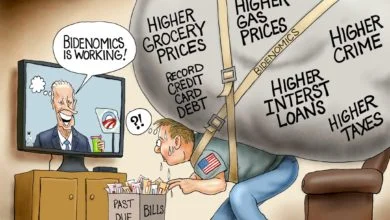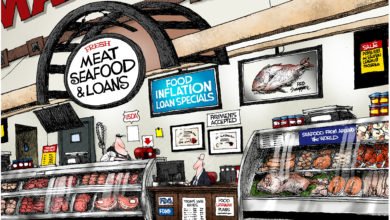Obama Needs to Stop Saying ‘I Am GM, Hear Me Roar’
If I have to hear left-wingers touting the “success” of the auto bailout one more time, I might as well toss a chair through my window. It’s patently false to say that the auto bailout was a success. Furthermore, it was more of an United Auto Workers union bailout than it was for the auto industry. As Amy Payne of Heritage wrote back in June:
The Treasury Department estimates that taxpayers will lose $23 billion on the auto bailout. Sherk and co-author Todd Zywicki [both are economists for Heritage] find that none of these losses came from saving jobs, but instead went to prop up the compensation of some of the most highly paid workers in America. They write:
We estimate that the Administration redistributed $26.5 billion more to the UAW than it would have received had it been treated as it usually would in bankruptcy proceedings. Taxpayers lost between $20 billion and $23 billion on the auto programs. Thus, the entire loss to the taxpayers from the auto bailout comes from the funds diverted to the UAW.
The Obama campaign is touting the bailout in Michigan this week, crowing about saved-or-created jobs. What the bailout actually saved was the UAW’s heavily padded compensation packages; what it created was a massive taxpayer loss.
Sherk and Zywicki also analyzed the amazing size of the bailout in their June report:
President Obama handed the United Auto Workers $26.5 billion—more than the U.S. spent on all foreign aid programs in 2011 ($20.6 billion). The union collected 50 percent more than NASA’s $17.6 billion budget for 2011, more than Missouri’s state budget ($23.2 billion), and almost as much as Indiana’s state budget ($26.7 billion). The UAW subsidies cost twice as much as Congress spent last year on the Executive Office of the President, the legislative branch, and the judicial branch combined ($12.3 billion); more than the Department of Labor spent on job trainingprograms ($11.0 billion); and almost as much as the cost of keeping federally funded extended unemployment insurance benefits in place in 2012 ($30.1 billion).
Now, Republicans have their hands in this mess too. It was under Bush that the seeds of “lemon socialism” were sown. George Will often mocked the bailout saying at CPAC 2010 that he doesn’t understand why Bush officials felt so strongly about this. He said that perhaps “they were haunted by the searing memories of the – continent wide urban unrest and civil disorders that accompanied the bankruptcy of Studebaker.”
However, Will aptly noted the market share isn’t where it should be if the bailout was paid for in his August 31 column.
Today, ‘I am GM, hear me roar‘ is again losing market share, and its stock, of which taxpayers own 26 percent, was trading Thursday morning at $21, below the $33 price our investor in chief paid for it and below the $53 price it would have to reach to enable taxpayers to recover the entire $49.5 billion bailout. Roaring GM’s growth is in China.
But let’s not call that outsourcing of manufacturing jobs, lest we aggravate liberalism’s current bewilderment, which is revealed in two words it dare not speak, and in a four-word phrase it will not stop speaking. The two words are both verbal flinches. One is ‘liberal,’ the other ‘spend.’ The phrase is ‘as we know it.’
However, let’s focus on the China element for a second. Obama claims that Mitt Romney and the Republicans are complicit in the evil dynamics of outsourcing. I don’t think liberals read Forbes much, but Paul Roderick Gregory wrote back in August 12 that:
To be exact: GM’s December 31, 2011 annual report shows General Motors of North America accounting for 98,000 of the 207,000 GM jobs worldwide. But 12,000 of these jobs are in Canada and 11,500 are in Mexico. Accordingly, GM has 74,500 jobs in the United States and 122,500 abroad, even after Obama’s touted surge in Detroit jobs. Almost two thirds of GM’s jobs are in other countries.
GM’s outsourcing is not a slip. GM clearly states that foreign investment and outsourcing of jobs are an integral parts of its growth strategy.
Grace D. Lieblein, President and CEO of GM Mexico, for example, proudly announced in a GM Mexico press release:
’75 years ago, General Motors came to our country with a dream to fulfill: turning Mexico into a prosperous nation for the benefit of millions of families. Today, after 75 years into the adventure, we have achieved goals that seemed unattainable, thanks to the efforts and dedication of Mexican talent. During the 75 years GM Mexico has been in operation, the subsidiary has produced 7 million vehicles, 20 million engines, and 4 million transmissions. GM Mexico employs 11,500 direct and about 90,000 indirect employees.’
So it now appears that GM’s goal is to make Mexico prosperous, not the good old US of A! In the same press release, GM heralds its upcoming billion dollar investments in its Mexican plants (versus a $100 million investment in Rochester, New York). It should have saved the Rochester announcement for another day.
So, why does the left and President Obama continue to peddle a narrative that is patently false? We haven’t been paid back for the UAW bailout – as indicated by the market price. GM’s growth strategy is centered on outsourcing and building plants outside the United States. A method of business he’s staunchly against and yet, the media seems silent on this issue.
It could be due to the dishonest diversion liberals in the media and on the Hill love to utilize against anyone who is against the bailout by threatening to ask him/her if GM and Chrysler should have gone bankrupt. Yes, I do!
As Payne mentioned, “if the UAW had been treated normally under bankruptcy law, the automakers’ average labor costs would have fallen to the same levels as the foreign-based carmakers, approximately $47 an hour. While this is still 40 percent higher compensation than the average manufacturing worker, it would have reduced UAW members’ standard of living. And the Administration wouldn’t allow that. So while the UAW accepted huge pay cuts for new hires, the Administration kept the pay structure of existing UAW members at GM intact.”
Furthermore, “even Stephen Rattner, President Obama’s ‘car czar,’ has admitted that ‘we should have asked the UAW to do a bit more. We did not ask any UAW member to take a cut in their pay.”
Furthermore, we lost precious savings from a normal bankruptcy proceeding as indicated by Sherk and Zywicki.
In a normal bankruptcy, the pay and benefits of existing union members likely would have been reduced, probably to prevailing labor market rates. Only the taxpayer bailout allowed the UAW to avoid this. Moreover, one reason why the Senate rejected a bailout of the automakers in December 2008 was the UAW’s refusal to reduce their compensation to market rates. But once the decision was made to divert already appropriated TARP funds to the task—a use that Treasury Secretary Henry Paulson initially deemed to be beyond the scope of the legitimate use of the TARP funds—neither the Bush nor Obama Administrations pressed this point.
If the bankruptcy had lowered GM’s average labor costs down to market rates, its costs would have fallen by $800 million a year. Such concessions would have reduced operating costs and the size of the government’s infusion of funds into the companies. They would have also raised profitability and thus the value of the government’s stake in GM. These concessions would have saved taxpayers—in present value terms—approximately $4.1 billion
The most infuriating part of this whole debacle is the preferential treatment UAW received from the Obama administration. In fact:
had the government treated the UAW in the manner required by bankruptcy law, the taxpayers would have been able to recoup their entire investment in the company. The program would have amounted to subsidized loans instead of a direct bailout. The Administration could have kept the automakers running without losing a dime.
Accomplishing this would have been straightforward. At Chrysler, the Treasury—not the UAW—could have received the $4.6 billion note and ownership of 41.5 percent of the company. At General Motors, the bankruptcy process could have operated normally, reducing GM’s compensation to market levels and raising the value of the government’s shares. The Treasury could have also received the $2.5 billion note, the $6.5 billion in preferred stock, and the excess shares of GM given to the union. The Administration could have directed the firm not to treat Delphi’s UAW members better than non-union retirees and put less money into GM. Had the Administration done so American taxpayers would not have lost $23 billion.
Concerning claims that millions would have lost their jobs through the bankruptcy process, Sherk and Zywicki aptly conclude that “General Motors and Chrysler would have had no difficulty filling entry-level positions even though they paid less than transplant automakers,” even under the threat of a strike, which wasn’t in the works in 2009. It’s all nonsense. Barack Obama and the Democrats needed to keep their parasitic allies in big labor happy at the expense of the American taxpayer. I know this is old history, but until the media and folks on our side have the gumption to say that the bailout was a horrible episode of government intervention– we should keep on hammering away at this. After all, it will probably be brought up in the debates.
Mr. President, stop saying “I am GM, hear me roar!” The facts just don’t support your narrative.





Very informative Matt! I laugh when people toot about the bailout too. Free Markets would have saved that industry. Ford would be doing better right now, because they were able to survive. There would have been less choices, which personally I feel is needed. The Auto Industry is viciously competitive right now.
Thanks Mike… i agree – it’s amusing
thanks for reading!